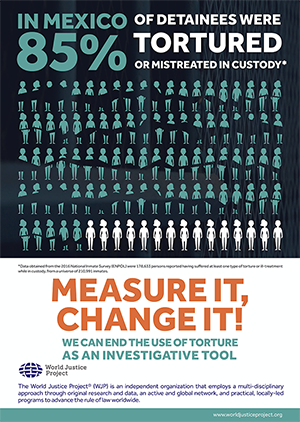
We are humbled and honored to have been chosen by the Paris Peace Forum on Tuesday as one of ten winning projects out of hundreds worldwide selected to present at the conference. Many congratulations to our Mexico team on their proposal to integrate statistics and storytelling to combat torture. Accompanying the win is support from the Forum organizers for our project and the opportunity to present on our progress at next year's Paris Peace Forum.
This is important, innovative work that can be expanded with your help. Thank you to all WJP supporters! Watch the announcement here (look for WJP at 35:45).
A New Approach to Preventing Torture
Through the use of inmate surveys and data analysis, together with storytelling and documentary filmmaking, the World Justice Project aims to promote more effective anti-torture norms and spur systemic reform.
The widespread use of torture has a corrosive effect on criminal justice systems and undermines peace and security over the world. The prohibition against torture is well-established in international and national laws, yet despite persistent efforts to promote implementation of this norm by the UN and other governmental and non-governmental organizations, in practice, torture is widely used in criminal justice systems—even where it is illegal.
Why start in Mexico? Torture is a persistent problem for Mexico’s criminal justice system, resulting in wrongful convictions and undermining legitimate investigative efforts to address widespread lawlessness and insecurity. Yet, in 2015, when the UN issued a report concluding that torture is widespread in Mexico, officials responded that the UN lacked adequate research methodologies to draw such conclusions. The lesson was crystal-clear. Better quality data was urgently needed.
Beginning in 2016, WJP’s Mexico team worked with a Mexican non-governmental organization, Lawyers with Cameras, and the Mexican Statistics Bureau (INEGI), to undertake an unprecedented survey of more than 58,000 prison inmates.
The results illustrated the scale and nature of the problem, revealing that 78% of respondents reported having been physically assaulted during arrest or detention. This is exceptionally exhaustive data set validated and contributed diagnostic rigor to the individual case documentation typically undertaken by human rights monitors.
Given funding, we now intend to expand data collection and analysis in Mexico to understand torture and its effects with the goal of identifying anti-torture measures that can inform reform and prevention efforts. And while effective data collection in collaboration with government authorities and trusted academic and civil society experts can go a long way to shift public perceptions and policy-makers’ perspectives, this data must be effectively communicated to non-expert audiences, using creative approaches such as documentaries that bring the numbers to life.
WJP's Mexico team includes the directors and producers of the award-winning documentary, Presumed Guilty, which portrays the experience of a man wrongfully convicted by Mexico’s broken criminal justice system. The film received widespread publicity in Mexico and around the world after it was banned nationwide, causing it to go viral underground and to have an immeasurable impact on public perceptions of Mexico’s justice system.
Ultimately, WJP will share data collection and analysis methodologies with anti-torture activists and policy-makers in other jurisdictions, to support the development of quantitative data, indicators and action plans for Sustainable Development Goals 16.1, 16.2, and 16.3.
Interested in joining us in this effort? Please contact us at [email protected]







